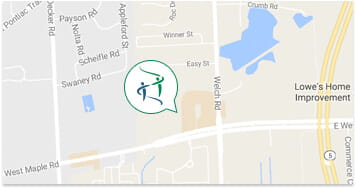Dr. Melanie Schwartz is seeing a lot of "when is this going to be over?"-type thinking, with frustration mounting over rapidly changing guidance from the CDC.
January and February are some of the toughest months for Michiganders.
In previous years, an increase in mental health concerns during this time could be attributed in part to seasonal depression. Now, however, the ongoing COVID-19 pandemic and surge of the Omicron variant are making this winter more challenging than ever for people in Metro Detroit.
"There's a feeling of hopelessness right now," says Dr. Melanie Schwartz, a Jewish clinical psychologist and owner of Viewpoint Psychology and Wellness, which has locations in Commerce Township and West Bloomfield. "You already have seasonal depression going on. And then you add in COVID, and then you add in people's everyday problems."
It's a combination that's led to an uptick in people seeking mental health care, Schwartz explains.
"We are seeing a lot more depression," she says. "We've definitely seen a resurgence of people's anxiety related to COVID."
A New Form of Anxiety
COVID-related anxiety never disappeared, Schwartz says, but it decreased last year when positive case numbers dropped significantly, and it felt like things were slowly returning to normal. Now, however, people are experiencing a new type of anxiety that is largely due to a specific type of fatigue that stems from dealing with what feels like a never-ending pandemic.
"People are having more anxiety because this [variant] seems way more out of control and people were doing everything they could to prevent COVID," Schwartz explains. "People are feeling very helpless and like they don't have any control over the situation."
Now, Michiganders are growing irritable. Schwartz is seeing a lot of "when is this going to be over?"-type thinking, with frustration mounting over rapidly changing guidance from the CDC.
"The information changes every day, which seems to also create anxiety for people because nobody knows what the right answer is anymore," she says. "There are those concerns and worries that people aren't doing what they're supposed to be doing [because of that]."
When it comes to how people are actually handling the Omicron surge, though, Schwartz says the response is mixed. Some people have chosen to quarantine once more and remain in mostly isolated settings, while others are choosing to go on with their lives as planned.
An Increase in Hypochondria
It's also a challenging time for people to accurately gauge their symptoms, which is leading to an increase in hypochondria, Schwartz says. "Any little symptom that you normally wouldn't think twice about... 'Is it COVID?' is the next thought that comes to your head. Health anxiety has significantly increased because just about anything can be a symptom at this point."
The uptick in anxiety can also blur the lines between stress-related symptoms and those caused by virus or illness because anxiety can also cause things like headaches, stomachaches, fatigue and a general feeling of being rundown. All these factors combined mean it's more important than ever for people to prioritize their mental health, Schwartz says, and to practice self-care.
"Self-care is important and making sure that you are doing things for your health," she explains. "Remember that this time of the year is hardest on everybody in Michigan, so you have to make sure you're eating healthy, exercising and socializing, whether that's in-person or virtually."
Finding Balance
Communication is key during this difficult time, so being able to have open discussions with loved ones about your personal comfort level matters.
"People are still across the board in terms of where their comfort level is with [Omicron]," Schwartz says. "I don't think there's any right or wrong; I think you just do whatever you're comfortable with."
The best way to handle that approach, Schwartz recommends, is to find balance.
"You can be talking about it too much and focusing on it too much, and that's not healthy," she says. "It can be hard to find that balance when that's all you see on TV and read; but at the same time, you have to talk about how you feel because you can't keep it inside. That's not good for you either."
Ultimately, it's essential to do what's right for you, Schwartz says. "Make sure that you're doing things that you enjoy. You have to be able to balance out something positive with all of the negative stuff that's thrown at us.
"Self-care leads to resilience," she adds, "that's what we need right now."



